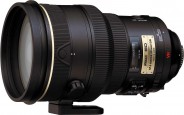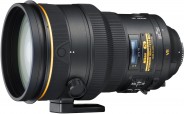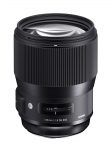Nikon AF DC-Nikkor 135mm F/2
Medium telephoto prime lens • Film era • Discontinued
- Announced:
- · October 1990
- Production status:
- ● Discontinued
- Country of design:
- · Japan
- Original name:
- · Nikon AF DC-NIKKOR 135mm 1:2
- Class:
- · Fast full-frame medium telephoto prime lens
- · Professional model
- System:
- · Nikon F (1959)
Abbreviations
| AF | Autofocus lens with mechanical coupling with camera. Learn more |
| DC | The lens features Defocus image Control. |
Model history (2)
| ■Nikon AF DC-Nikkor 135mm F/2 | A | 7 - 6 | 1.10m | ⌀72 | 1990 ● | |
| ■Nikon AF DC-Nikkor 135mm F/2D | A | 7 - 6 | 1.10m | ⌀72 | 1995 ● | |
Specification
| Optical design: | |
| 35mm full frame | |
| 135mm | |
| F/2 | |
| 7 elements in 6 groups | |
| Internal focusing (IF) | |
| Nikon F [46.5mm] | |
| 18.2° (35mm full frame) | |
| On Nikon D APS-C [1.53x] cameras: | |
35mm equivalent focal length: | 206.6mm (in terms of field of view) |
35mm equivalent speed: | F/3.1 (in terms of depth of field) |
Diagonal angle of view: | 12° |
| Diaphragm mechanism: | |
Diaphragm type: | Automatic |
Aperture control: | Aperture ring (Manual settings + Auto Exposure setting) |
| 9 (nine) | |
| Focusing: | |
| 1.10m | |
| 1:7.1 | |
Focusing modes: | Autofocus (A), Manual focus (M) |
Autofocus motor: | In-camera motor |
Manual focus control: | Focusing ring |
Focus mode selector: | A - M |
Manual focus override in autofocus mode: | - |
| Vibration Reduction (VR): | |
| - | |
| Physical characteristics: | |
| 870g | |
| ⌀79×120mm | |
| - | |
| - | |
| Accessories: | |
| Screw-type 72mm | |
| Built-in telescopic round | |
| Nikon Teleconverter TC-14B → 189mm F/2.8 |
Source of data
- Manufacturer's technical data.
Manufacturer description
AF DC (Defocus image Control)-Nikkor 135mm f/2 enables you to defocus the background or foreground. The lens' rounded diaphragm opening makes out-of-focus elements appear as circular high-lights on your pictures.
While pushing the DC ring lock button, rotate the DC ring toward the R (rear) side to blur the background, or toward the F (front) side to blur the foreground. To effectively blur background or foreground images, turn the DC ring so the f-number on the ring that corresponds to aperture in use aligns with the index on the DC ring. Turning the ring beyond the aperture in use lets you create a soft-focus effect.
With the DC ring at either the F or R side, the focusing ring may not show the correct distance.
Defocus control should always be performed before focusing. If you rotate the DC ring after focusing, or during focus lock in autofocus photography, your subject will be out of focus.
The effect of defocus image control depends on subject conditions such as subject-to-background distance, subject-to-foreground distance, etc. As you cannot verify the results through the viewfinder, perform bracketing with the DC ring at various settings to obtain the desired effect.
From the editor
A completely new type of lens added by Nikon to their line-up in 1990. It has a special Defocus Control operated by turning a ring set around the barrel, which shifts certain elements within the lens independently of the focus action that either under, or over corrects the spherical aberration in the out-of-focus highlights. This control allows the photographer to apply a graduated amount of softness to the out-of-focus areas, either in front of, or behind the subject, by matching the aperture value on the DC ring to the shooting aperture whilst maintaining a crisp sharpness in the plane of focus. Setting the DC ring to an aperture value that is smaller than the shooting aperture induces softness over the entire image. The degree of softness increases the more the DC aperture value deviates from the shooting aperture. Since the system operates by using spherical aberration, which is largely eliminated at small apertures the most pronounced effect is achieved between f2 and f5.6.
The lens was an instant hit with fashion photographers who wished to isolate their model from the background.
Notes
- The autofocus will not be available with Nikon D40, D40X, D60, D3000-D3500, D5000-D5600 digital SLR cameras.
Compared to other medium telephoto prime lenses in the Nikon F system
- Optimized for more impressive and pleasing bokeh, along with the AF DC-Nikkor 135/2D
- Shortest closest focusing distance (1.10m), along with the AF DC-Nikkor 135/2D
- Shortest length (120mm), along with the AF DC-Nikkor 135/2D
Other medium telephoto prime lenses in the Nikon F system
| ■Nikon F mount (6) | |||||||||
| Nikon AF DC-Nikkor 135mm F/2D • ⌀72 | Pro | 1995 ● | compare | 0 | 0 | ||||
| Nikon AF Nikkor 180mm F/2.8 IF-ED [I] • ⌀72 | Pro | 1986 ● | compare | 0 | 3 | ||||
| Nikon AF Nikkor 180mm F/2.8 IF-ED [II] • ⌀72 | Pro | 1987 ● | compare | 0 | 3 | ||||
| Nikon AF Nikkor 180mm F/2.8D IF-ED • ⌀72 | Pro | 1994 ● | compare | 1 | 3 | ||||
| Nikon AF-S Nikkor 200mm F/2G ED-IF VR | Pro | 2004 ● | compare | 6 | 5 | ||||
| Nikon AF-S Nikkor 200mm F/2G ED VR II | Pro | 2010 ● | compare | 7 | 5 | ||||
Lenses with similar focal length
| ■Nikon F mount (1) | |||||||||
| Sigma 135mm F/1.8 DG HSM | A • ⌀82 | Pro | 2017 ● | compare | 8 | 2 | ||||
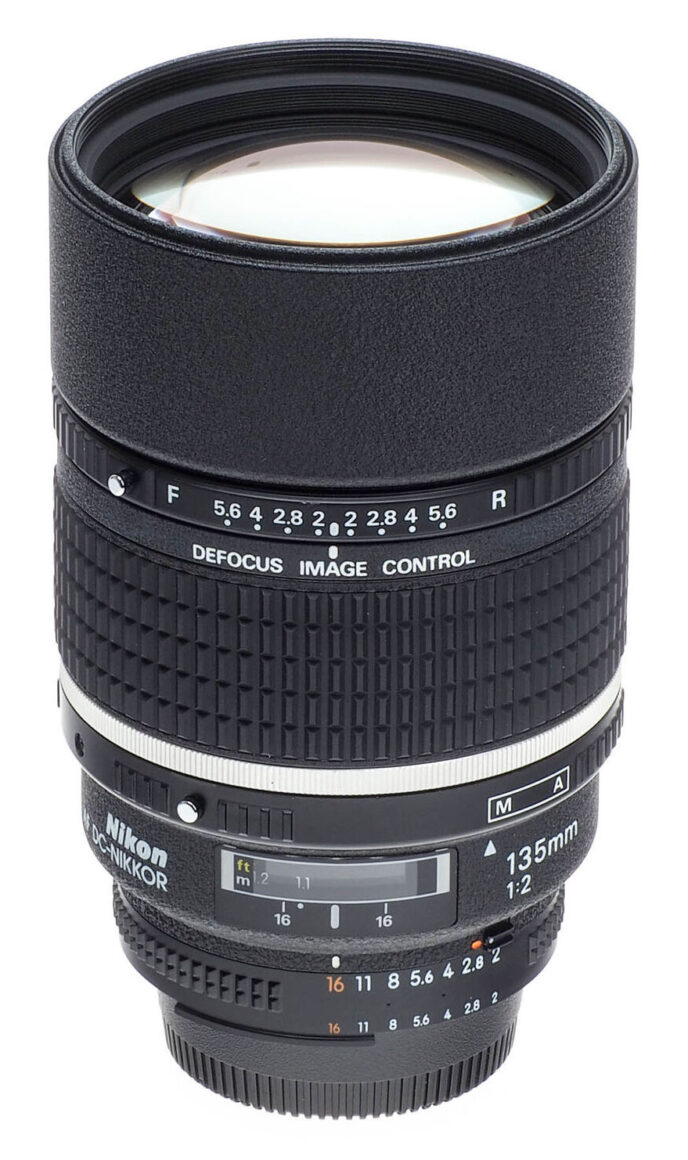




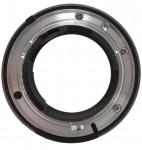
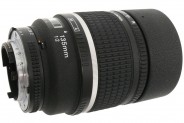
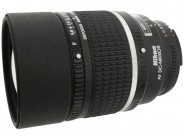
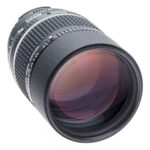



![Nikon AF Nikkor 180mm F/2.8 IF-ED [I]](https://lens-db.com/wp-content/uploads/2012/10/af-nikkor-ed-180-28-if-81x150.jpg)
![Nikon AF Nikkor 180mm F/2.8 IF-ED [II]](https://lens-db.com/wp-content/uploads/2012/10/50197_6-82x150.jpg)

